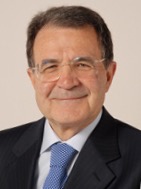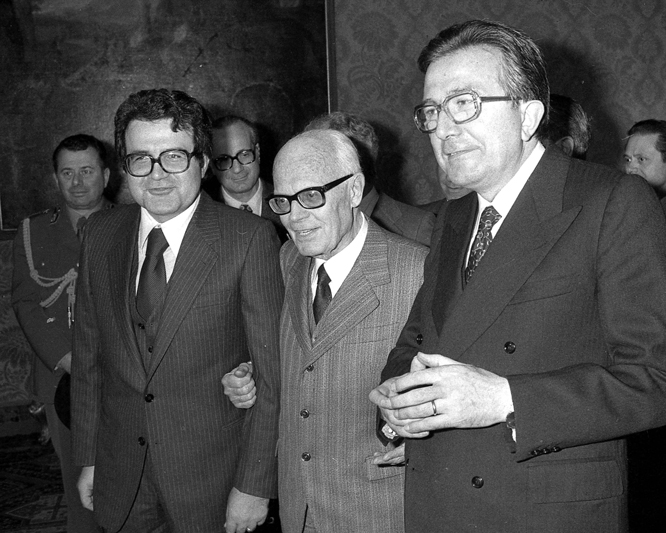|
Party Of Italian Communists
The Party of Italian Communists ( it, Partito dei Comunisti Italiani, PdCI) was a communist party in Italy established in October 1998 by splinters from the Communist Refoundation Party (PRC). The split was led by Armando Cossutta, founder and early leader of the PRC, who opposed Fausto Bertinotti's leaderhip and, especially, his decision to withdraw support from Romano Prodi's first cabinet. In December 2014, the party was transformed into Communist Party of Italy (PCd'I), which would later evolve into the re-edition of the Italian Communist Party (PCI). History Foundation and early years In October 1998, the PRC was divided between those who wanted to stop supporting Romano Prodi's first government, led by PRC secretary Fausto Bertinotti; and those who wanted to continue the alliance, led by PRC president Cossutta. The central committee endorsed Bertinotti's line, but Cossutta and his followers decided to support Prodi nonetheless. The votes of ''cossuttiani'' were not en ... [...More Info...] [...Related Items...] OR: [Wikipedia] [Google] [Baidu] |
Italian Communist Party
The Italian Communist Party ( it, Partito Comunista Italiano, PCI) was a communist political party in Italy. The PCI was founded as ''Communist Party of Italy'' on 21 January 1921 in Livorno by seceding from the Italian Socialist Party (PSI). Amadeo Bordiga, Antonio Gramsci, and Nicola Bombacci led the split. Outlawed during the Fascist regime, the party played a major role in the Italian resistance movement. It changed its name in 1943 to PCI and became the second largest political party of Italy after World War II, attracting the support of about a third of the vote share during the 1970s. At the time, it was the largest communist party in the West, with peak support reaching 2.3 million members, in 1947, and peak share being 34.4% of the vote (12.6 million votes) in the 1976 general election. The PCI transitioned from doctrinaire Marxism–Leninism to democratic socialism by the 1970s or the 1980s and adhered to the Eurocommunist trend. In 1991, it was dissolved and re-l ... [...More Info...] [...Related Items...] OR: [Wikipedia] [Google] [Baidu] |
The Other Europe
The Other Europe ( it, L'Altra Europa), whose full name was The Other Europe with Tsipras (''L'Altra Europa con Tsipras'', AET), was a left-wing political organisation in Italy. It took part in the 2014 European Parliament election in support of Alexis Tsipras, the candidate of the Party of the European Left for President of the European Commission. History In the 2014 EP election the list obtained 4.0% of the vote, just above the 4% threshold, and 3 elects to the European Parliament: Eleonora Forenza (Communist Refoundation Party), Curzio Maltese (independent, later Left Ecology Freedom) and Barbara Spinelli (independent). After the election, they joined the European United Left–Nordic Green Left (GUE/NGL) Group. In May 2015 Spinelli left AET, becoming an independent MEP within GUE/NGL. In July 2015 two senators, Fabrizio Bocchino and Francesco Campanella, elected in the 2013 general election with the Five Star Movement and later founding members of the short-lived Italy Wor ... [...More Info...] [...Related Items...] OR: [Wikipedia] [Google] [Baidu] |
Massimo D'Alema
Massimo D'Alema (; born 20 April 1949) is an Italian politician and journalist who was the 53rd prime minister of Italy from 1998 to 2000. He was Deputy Prime Minister of Italy and Minister of Foreign Affairs from 2006 to 2008. D'Alema also served for a time as national secretary of the Democratic Party of the Left (PDS). The media has referred to him as ''Leader Maximo'' due to his first name and for his dominant position in the left-wing coalitions during the Second Republic. Earlier in his career, D'Alema was a member of the Italian Communist Party and was the first former communist to become prime minister of a NATO country and the only former communist prime minister of Italy. Biography D'Alema was born in Rome on 20 April 1949, the son of Giuseppe D'Alema, a communist politician. He is married to Linda Giuva, a professor at the University of Siena, and has two children, Giulia and Francesco. He later became a notable member of the Italian Communist Party (PCI), the bulk o ... [...More Info...] [...Related Items...] OR: [Wikipedia] [Google] [Baidu] |
D'Alema I Cabinet
The first D'Alema government was the government of Italy from 21 October 1998 to 22 December 1999. The first Prodi government fell in 1998 when the Communist Refoundation Party withdrew its support to Prodi. This led to the formation of a new government led by Massimo D'Alema as Prime Minister. There are those who claim that D'Alema deliberately engineered the collapse of the Prodi government to become Prime Minister himself. As the result of a vote of no confidence in Prodi's government, D'Alema's nomination was passed by a single vote. This was the first and so far, the only occasion in the history of the Italian republic on which a vote of no confidence had ever been called; the Republic's many previous governments had been brought down by a majority "no" vote on some crucially important piece of legislation (such as the budget). Party breakdown Ministers Ministers and other members * Democrats of the Left (DS): Prime minister, 7 ministers and 22 undersecretaries * Italian P ... [...More Info...] [...Related Items...] OR: [Wikipedia] [Google] [Baidu] |
Prodi I Cabinet
The first Prodi government was the 53rd government of Italy. It held office from 18 May 1996 until 21 October 1998. Formation On 21 April 1996, the Olive Tree won 1996 general election in alliance with the Communist Refoundation Party (PRC), making Romano Prodi Prime Minister of Italy. The Olive Tree's main component was the Democratic Party of the Left, which contained the bulk of the former Italian Communist Party. The PDS' Walter Veltroni, who ran in ticket with Prodi in a long electoral campaign, served as Deputy Prime Minister, and 15 other PDS ministers joined him in cabinet alongside 10 PDS junior ministers. It was the first time that (former) Communists had taken part in government since 1947. Besides the external support of PRC, the coalition received the support also of some minor parties: the Italian Republican Party (PRI, social-liberal), The Network (social-democratic), the South Tyrolean People's Party ( regionalist and Christian democratic) and some other minor p ... [...More Info...] [...Related Items...] OR: [Wikipedia] [Google] [Baidu] |
Italian Communist Party (2016)
The Italian Communist Party ( it, Partito Comunista Italiano, PCI) is a minor communist party in List of political parties in Italy, Italy. History The PCI, which took the name from the 1926–1991 Italian Communist Party, emerged in 2016 from the merger of the Communist Party of Italy (2014), Communist Party of Italy (PCdI) with splinters from the Communist Refoundation Party (PRC) and minor groups. The foundation of the new PCI took place ninety years after the transformation of the old Communist Party of Italy into the old PCI. After the founding congress, Mauro Alboresi was elected secretary by the party's newly formed national committee. In the 2018 Italian general election, 2018 general election, the PCI was part of the Power to the People (Italy), Power to the People electoral list, which obtained 1.1% of the vote and no seats. Soon after, the party left the list. In July the PCI held its first regular congress. In July 2022 the PCI, together with other far-left parties ... [...More Info...] [...Related Items...] OR: [Wikipedia] [Google] [Baidu] |
Prodi II Cabinet
The second Prodi government was the cabinet of the government of Italy from 17 May 2006 to 8 May 2008, a total of 722 days, or 1 year, 11 months and 21 days. The 59th cabinet of the Italian Republic, it was the only cabinet of the XV Legislature. It was composed of 24 ministers, 10 deputy-ministers and 66 under-secretaries, for a total of 102 members. This was the first government of the Republic in which the Communist Refoundation Party and the Italian Radicals participated directly, and the first government supported by the entire parliamentary left wing since the De Gasperi III Cabinet in 1947. Formation Romano Prodi led his coalition to the electoral campaign preceding the election, eventually won by a very narrow margin of 25,000 votes, and a final majority of two seats in the Senate, on 10 April. Prodi's appointment was somewhat delayed, as the outgoing President of the Republic, Carlo Azeglio Ciampi, ended his mandate in May, not having enough time for the usual proc ... [...More Info...] [...Related Items...] OR: [Wikipedia] [Google] [Baidu] |
Romano Prodi
Romano Antonio Prodi (; born 9 August 1939) is an Italian politician, economist, academic, senior civil servant, and business executive who served as the tenth president of the European Commission from 1999 to 2004. He served twice as Prime Minister of Italy, first from 18 May 1996 to 21 October 1998, and then from 17 May 2006 to 8 May 2008. Prodi is considered the founder of the Italian centre-left and one of the most prominent and iconic figures of the so-called Second Republic. He is often nicknamed ''Il Professore'' ("The Professor") due to his academic career. A former professor of economics and international advisor to Goldman Sachs, Prodi ran as lead candidate of The Olive Tree coalition, winning the 1996 Italian general election and serving as Prime Minister until 1998. Following the victory of his coalition The Union over the House of Freedoms led by Silvio Berlusconi in the 2006 Italian general election, Prodi took power again. On 24 January 2008, he lost a ... [...More Info...] [...Related Items...] OR: [Wikipedia] [Google] [Baidu] |
Fausto Bertinotti
Fausto Bertinotti (born 22 March 1940) is an Italian politician who led the Communist Refoundation Party (''Partito della Rifondazione Comunista'') from 1994 to 2006. On 29 April 2006, after the centre-left coalition's victory in the Italian general election, he was elected President of the Chamber of Deputies, a position he held until 2008. Trade unionist Bertinotti was born to Enrico Bertinotti, a railroad engineer, and Rosa Bertinotti. After completing his education in Milan, he joined the CGIL (General Confederation of Italian Labour) in 1964, becoming secretary of the local organisation of the Federazione Italiana degli Operai Tessili (Italian Textile Workers Federation). Three years later, he became president of the labour chamber of Novara. From 1975 to 1985 he was regional secretary of the CGIL in Piedmont. In 1972 he joined the Italian Communist Party (PCI), and soon afterwards became the leader of the most left-wing tendency in the CGIL, called "Essere Sindacato" ... [...More Info...] [...Related Items...] OR: [Wikipedia] [Google] [Baidu] |
List Of Political Parties In Italy
This article contains a list of political parties in Italy since Italian unification in 1861. Throughout history, numerous political parties have been operating in Italy, and since World War II no party has ever gained enough support to govern alone: parties thus form political alliances and coalition governments. In the 2022 general election four groupings obtained most of the votes and most of the seats in the two houses of the Italian Parliament: a centre-right coalition, composed of Brothers of Italy, Lega, Forza Italia, and minor allies; a centre-left coalition, composed of the Democratic Party and minor allies; the anti-establishment Five Star Movement; the liberal Action – Italia Viva. Coalitions of parties for regional elections can be slightly different from those for general elections, due to different regional conditions (for instance, in some regions the Five Star Movement and the Democratic Party are in coalition, but not in other ones) and the presence of ... [...More Info...] [...Related Items...] OR: [Wikipedia] [Google] [Baidu] |
Communist Party
A communist party is a political party that seeks to realize the socio-economic goals of communism. The term ''communist party'' was popularized by the title of ''The Manifesto of the Communist Party'' (1848) by Karl Marx and Friedrich Engels. As a vanguard party, the communist party guides the political education and development of the working class (proletariat). As a ruling party, the communist party exercises power through the dictatorship of the proletariat. Vladimir Lenin developed the idea of the communist party as the revolutionary vanguard, when the socialist movement in Imperial Russia was divided into ideologically opposed factions, the Bolshevik faction ("of the majority") and the Menshevik faction ("of the minority"). To be politically effective, Lenin proposed a small vanguard party managed with democratic centralism which allowed centralized command of a disciplined cadre of professional revolutionaries. Once a policy was agreed upon, realizing political goals req ... [...More Info...] [...Related Items...] OR: [Wikipedia] [Google] [Baidu] |
Carrara Communisti Italiani 6358
Carrara ( , ; , ) is a city and ''comune'' in Tuscany, in central Italy, of the province of Massa and Carrara, and notable for the white or blue-grey marble quarried there. It is on the Carrione River, some west-northwest of Florence. Its motto is ''Fortitudo mea in rota'' (Latin: "My strength is in the wheel"). Toponymy The word ''Carrara'' likely comes from the pre-Roman (Celtic or Ligurian) element ''kar'' (stone), through Latin ''carrariae'' meaning 'quarries'. History There were known settlements in the area as early as the ninth century BC, when the Apuan Ligures lived in the region. The current town originated from the borough built to house workers in the marble quarries created by the Romans after their conquest of Liguria in the early second century BC. Carrara has been linked with the process of quarrying and carving marble since the Roman Age. Marble was exported from the nearby harbour of Luni at the mouth of the river Magra. In the early Middle Ages it was ... [...More Info...] [...Related Items...] OR: [Wikipedia] [Google] [Baidu] |







